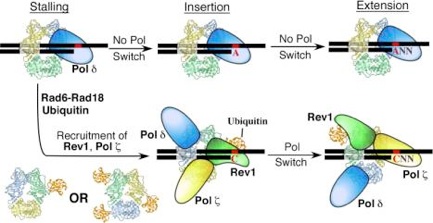Mutagenesis
 Under conditions of DNA damage or other replication fork stress, the normal replication functions are altered in order to deal with these challenges in a timely manner. Key factors essential for fork progression are also instrumental in coupling DNA replication to the DNA damage response pathways. Our biochemical and genetic studies focus on translesion synthesis (TLS) by DNA polymerase ζ, the major enzyme responsible for the bulk of damage-induced mutagenesis in eukaryotic cells. Damage induced mutagenesis is coordinated through the Rev1 protein, that interacts with Pol ζ and with the replication clamp PCNA, hence the mutasome. In the past, we have identified the pathway that leads to mono-ubiquitination of PCNA and its consequences for recruitment and activity of the mutasome. We are now engaged in delineating other regulatory steps that are required for turning on mutagenesis, and for terminating this response.
Under conditions of DNA damage or other replication fork stress, the normal replication functions are altered in order to deal with these challenges in a timely manner. Key factors essential for fork progression are also instrumental in coupling DNA replication to the DNA damage response pathways. Our biochemical and genetic studies focus on translesion synthesis (TLS) by DNA polymerase ζ, the major enzyme responsible for the bulk of damage-induced mutagenesis in eukaryotic cells. Damage induced mutagenesis is coordinated through the Rev1 protein, that interacts with Pol ζ and with the replication clamp PCNA, hence the mutasome. In the past, we have identified the pathway that leads to mono-ubiquitination of PCNA and its consequences for recruitment and activity of the mutasome. We are now engaged in delineating other regulatory steps that are required for turning on mutagenesis, and for terminating this response.